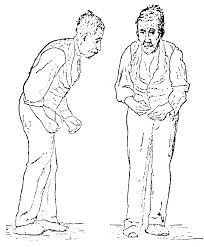Parkinson’s Disease in short
This progressive disorder which prevents movement is one that often over time worsen. It’s a widespread aliment, and few are without contact with someone heavily affected by it. In the current time we still hold no cure for this disease, however medical research has expanded the treatment options available for patents which have developed and branched out much in recent years.
Those affected by the disease experience symptoms caused by malfunctioning neurons and dying nerve cells meaning that they cannot control movement as normal. The physical manifestation of Parkinson’s disease is of course different from person to person, however there are some common symptoms to be aware of. Tremors in the hands, arms, legs, feet and face are often an indication, just as slow movement and imbalanced posture, which often also comes with impaired balance and coordination of movement.
Of course medical research is taking place to find a cure for this disease which touch and disrupt the lives of so many, research which of course is always in need of aid. If you are interested in finding out more about Parkinson’s disease, of if you suspect that someone close to you have displayed the common symptoms mentioned ensure to seek help and advice from a professional immediately.

Parkinsonism or Atypical Parkinsonism may be terms which you have heard, these are often used as umbrella terms for those with similar symptoms of Parkinson’s Disease. What is worth noting is that often in early diagnosis it’s difficult to tell if a patient has the typical disease or a different type of syndrome mimicking the symptoms. In many patients the typical disease as well as additional syndromes are present. Should you require further information due to suspecting symptoms in yourself or someone you know, please contact your doctor as soon as possible.
Parkinson’s Disease and Tradespeople: Navigating Challenges with Resilience
Parkinson’s disease, a neurodegenerative disorder that primarily affects movement, has far-reaching impacts on individuals across various professions. In this article, we delve into the unique challenges faced by tradespeople such as plumbers, locksmiths, and drain engineers who grapple with Parkinson’s disease. We explore the intricate interplay between physical demands, cognitive function, and emotional well-being, highlighting strategies to effectively manage the condition and maintain a fulfilling professional life.
Understanding Parkinson’s Disease
Unveiling the Neurological Complexity
Parkinson’s disease is a progressive disorder that disrupts the brain’s intricate network of nerve cells, specifically those responsible for producing dopamine. This deficiency leads to the characteristic motor symptoms like tremors, rigidity, and bradykinesia. However, recent research indicates that Parkinson’s also involves non-motor symptoms, affecting mood, cognition, and overall quality of life.
The Tradespeople’s Predicament
The Physically Demanding Nature of the Trade
Tradespeople, including plumbers, locksmiths, and drain engineers, often work in physically demanding environments. The nature of their profession requires dexterity, strength, and stamina. Unfortunately, Parkinson’s motor symptoms can impede these crucial attributes, making even simple tasks challenging.
Cognitive Challenges and Safety Concerns
Beyond physical hurdles, cognitive impairments associated with Parkinson’s disease can jeopardize the safety of tradespeople and those around them. Concentration, problem-solving, and quick decision-making are integral to their roles, and any cognitive lapse could lead to accidents or errors.
Strategies for Overcoming Challenges
Adapting Work Techniques
Tradespeople living with Parkinson’s can explore ergonomic tools and modified work techniques to accommodate their evolving physical abilities. Leveraging assistive technologies and making adjustments to their workspaces can significantly enhance efficiency and safety.
Prioritizing Self-Care
To combat the emotional toll of Parkinson’s, tradespeople must prioritize self-care. Engaging in regular exercise, maintaining a balanced diet, and seeking psychological support can aid in managing both motor and non-motor symptoms.
Embracing a Supportive Network
Open communication with employers, colleagues, and clients is vital. A supportive network can foster understanding and create an environment where tradespeople feel comfortable discussing their condition and requesting reasonable accommodations.
A Testament to Resilience
Despite the challenges, numerous tradespeople continue to thrive in their professions after a Parkinson’s diagnosis. Their stories inspire resilience and underscore the importance of determination and adaptation.
FAQs About Parkinson’s Disease in Tradespeople
- Can tradespeople with Parkinson’s disease still work? Absolutely. With appropriate adjustments and support, many tradespeople effectively manage their condition and continue working.
- Are there specific tools designed for tradespeople with Parkinson’s? Yes, there are adaptive tools and equipment available that cater to the needs of individuals with Parkinson’s disease.
- How can employers contribute to a Parkinson’s-friendly workplace? Employers can offer flexible schedules, ergonomic workspaces, and sensitivity training to create an inclusive environment.
- What resources are available for tradespeople with Parkinson’s disease? Various Parkinson’s organizations offer resources, support groups, and educational materials tailored to tradespeople’s needs.
- What role does emotional well-being play in managing Parkinson’s? Emotional well-being significantly impacts symptom management. Engaging in activities that bring joy and seeking emotional support are crucial.
Conclusion
In the world of tradespeople, the tenacity to overcome challenges is part of the job description. Parkinson’s disease may introduce new hurdles, but with determination, adaptation, and a robust support system, plumbers, locksmiths, drain engineers, and others can continue to contribute their invaluable skills to society. By embracing a Parkinson’s-friendly approach, we pave the way for an inclusive and compassionate working environment.